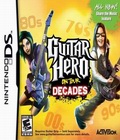Genre: Rhythm
Publisher: Activision
Developer: Vicarious Visions
Release Date: November 17, 2008
Opening up my copy of Guitar Hero on Tour: Decades, I was struck by the strangest sense of déjà vu. I pulled out the exact same guitar grip peripheral that caused endless hand craps and finger soreness, and plopped in a game that looked, sounded and performed precisely the same way as the disappointing original. No amount of rubbing my eyes, flipping the DS off and on or carefully inspecting the SD card was able to change the truth that was before me: Decades is the exact same game we've already seen once before, complete with all of the shortcomings and flaws that have already been discussed to death. If you really, really love the franchise, then you can buy this game for completion's sake, but if you've already played On Tour or any of the vastly superior console versions, then skipping this one will mean that you won't miss much.
Guitar Hero on a handheld is still a fairly new phenomenon and one that presents its own set of challenges. Rather than devising some sort of connectivity device so that gamers could use their existing plastic guitars to play notes on the tiny screen, Activision and Vicarious Visions opted for a more portable solution, devising a "guitar grip" that can be plugged into the GBA slot and used to simulate the traditional franchise experience. The device would be ingenious if it weren't so painful, as there's no good way to hold the DS and play the game without experiencing all manner of hand cramps and forearm pain. Indeed, half the challenge of Guitar Hero on the DS is devising some sort of way in which to brace your arm and play the game at the same time.
These discomfort issues were made very clear when the first game in the series launched, and there was great hope that some strides would be made with Decades to devise a solution. Unfortunately, Activision took the easy way out, shipping the exact same flawed peripheral right back onto the market once more. They didn't even have the decency to slap a new skin on it (there is a new skin, but you have to apply it yourself); they just sent out the same defective hardware once more and put the onus on gamers to figure out how to play without getting injured. It's really unforgivable, as no one should be forced to play a game that has the capacity to hurt you even if you aren't doing anything wrong.
Once you lose feeling in your arm and decide to give in and play the game itself, you'll see that there's not much going on here that you haven't seen before. There are no new characters to speak of, and the career mode still consists of playing all of the songs on a set list in order to unlock a new venue and a new set of songs. The only difference is that this time, songs are arranged by decade, so you start out with modern hits and progressively work backward through the early 2000s, then the '90s, '80s and '70s. The one big change is that songs no longer become more difficult as you get deeper into the game, but rather as you move through the current set list. Therefore, you'll start out with something fairly simple in one decade, move up through a challenging encore, and then drop right back to simplicity once you move on to the next venue. It's actually rather jarring and can really throw you when you've gone from a finger-twisting solo down to a simple "keep the rhythm, play a few flourishes" number.
In addition to the traditional lead guitar career mode, Decades also allows players to opt to play through as the rhythm guitarist/bassist or take on a series of duels. The rhythm/bassist option is exceptionally boring, as most of the songs in the game were picked for their main guitar riffs and crazy solos without any eye turned to what the other members of the band are up to. Duel mode is the same as it was before, with tug-of-war gameplay and battle items that you either love or hate, depending on your disposition. Once again, there's nothing new to see.
The songs selected for the soundtrack are just as tired and played out as the rest of the game, with most of them having already been done to death by their console big brothers. I'm not saying Jimmy Eat World's "The Middle" is a bad song, but I've already played it in both Rock Band and Guitar Hero. Do I really need to go through it again? The same goes for the Foo Fighter's "The Pretender," Paramour's "Crushcrushcrush" and many, many others. Of the game's 28 tracks, fewer than half of them are new entries into the genre, leaving me to wonder if we're starting to hit the wall for what the rhythm genre has to offer. Also, because the game's issues with registering when you strum seems to be even more pronounced than last time, all of these songs are infinitely more fun to play on the consoles.
There is one area where Decades shows off, and that's in the multiplayer. The game allows you to also unlock the original Guitar Hero on Tour set list, allowing you to play any song you like without switching cards. Also, if your friend only has the original game and hasn't picked up Decades yet, you can still play together without any issue. It's an exceptional feature and one of the few things about the game that I can heartily recommend without any reservation.
Unfortunately, that's the only bright spot in the game, as the rest of it screams that it's nothing but a rushed sequel pushed out the door to line Activision's pockets during the holiday season. The guitar grip hardware is just as poorly designed as ever, and the game itself is nothing more than a re-skinned version of the original with a few new songs. Furthermore, nagging issues, such as strum recognition and the fact that the guitar grip has a tendency to become unplugged, haven't been addressed, meaning that not a single problem brought up from the original game has been fixed.
Activision has done to handhelds the same thing they did to console owners when they released Guitar Hero: Rocks the '80s, but on a slightly broader scale. There's no innovation here, no effort and also no heart. If you don't own any of the console versions of Guitar Hero or Rock Band and really need a fix, then Decades will scratch your musical itch, but please understand that there are much better alternatives out there. The entire Decades experience can be summed up in six words: "Second verse, same as the first," and in this case, that's definitely not a good thing.
Score: 6.0/10
More articles about Guitar Hero On Tour: Decades











 Handheld gamers will once again have the freedom to unleash their inner rock star anywhere, anytime with Vicarious Visions' Guitar Hero On Tour Decades which will now also introduce song share between NDS players with different versions of On Tour.
Handheld gamers will once again have the freedom to unleash their inner rock star anywhere, anytime with Vicarious Visions' Guitar Hero On Tour Decades which will now also introduce song share between NDS players with different versions of On Tour.




















